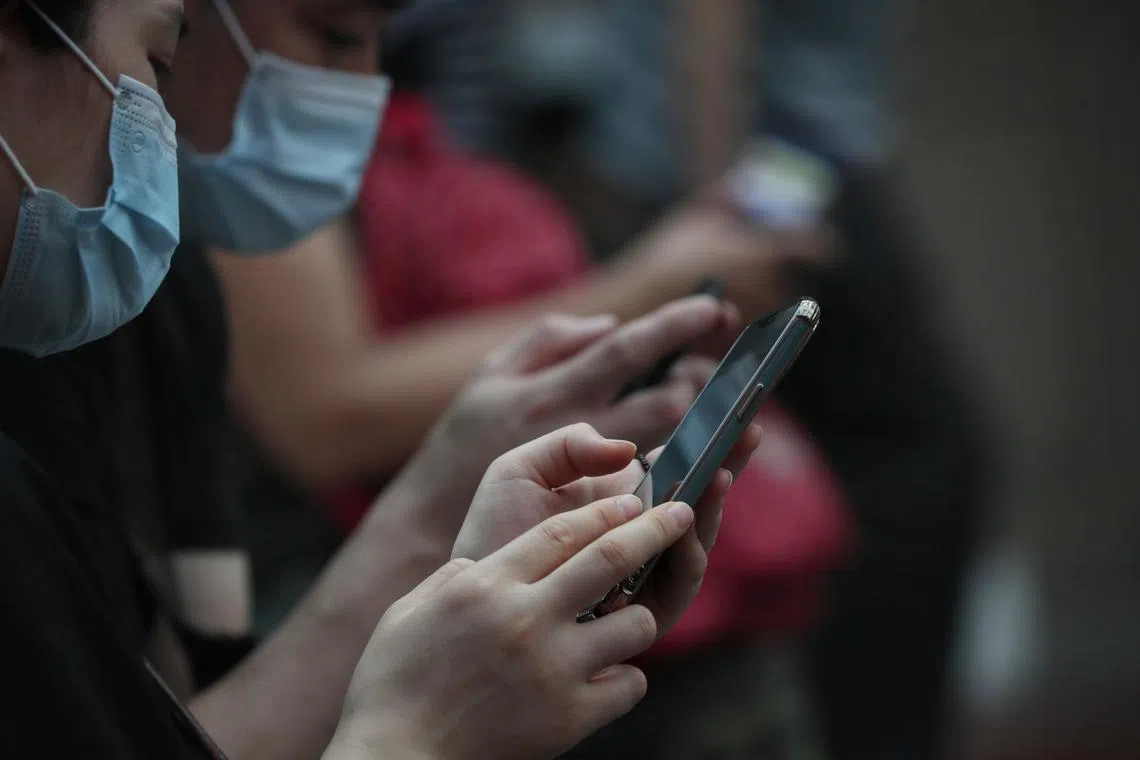S’pore to tackle harmful content in app stores, online games; set rules for collection of children’s data
Sign up now: Get ST's newsletters delivered to your inbox

The Government will develop a new code of practice for app stores to require the removal of harmful content circulating on the marketplace.
PHOTO: ST FILE
Follow topic:
SINGAPORE - App stores could be required to remove harmful content from the marketplace as Singapore moves to secure its digital spaces, particularly for children. This includes addressing risks associated with harmful content in online games, possibly by putting in place a classification system for them.
The Republic will also address over the next 12 to 18 months how children’s personal data is collected and how data can be used in artificial intelligence (AI) systems, Minister for Communications and Information Josephine Teo said on Tuesday.
Specifically, the Government will develop a new code of practice that will require app stores to deal with harmful content circulating on the marketplace.
“App stores may carry apps with harmful content, especially for children. This could include content depicting explicit sexual activities or inciting violence,” Mrs Teo said, adding that the code will involve industry consultation.
She was responding to questions from Ms Tin Pei Ling (MacPherson) on how the Ministry of Communications and Information (MCI) will clamp down on harmful content found on platforms beyond social media services, like those in the metaverse.
The code of practice for app stores will complement the Code of Practice for Online Safety,
The latter will require all social media firms with significant reach, such as Instagram and Facebook, to put in place systems to limit Singapore users’ exposure to online harms,
MCI will also look to reduce Singapore users’ exposure to harmful content through games, possibly through a classification scheme for online games, similar to age ratings for video games, said Mrs Teo.
“This will clarify the age-appropriateness of games and help parents exercise better supervision over their children’s online gaming,” she said.
“Apps with egregious content may also become unavailable for download. But games may still be accessed through platforms other than app stores, and we will study how to deal with this.”
The spotlight on gaming follows reports of online games being rife with lewd and other harmful content.
In a recent case in Singapore, the Internal Security Department learnt that a radicalised teen had joined several Roblox servers
Later in 2023, the Personal Data Protection Commission will publish guidelines for industries, including the best practices on the use of personal data to train, test and monitor AI systems.
Children’s personal data guidelines will also be issued to social media services and companies whose products are used by children.
This advisory will specify that parental consent must be obtained before collecting data from children under 13, and that a child’s profile is not made public by default.
Touching on why MCI is funding public service media such as publications run by SPH Media and Mediacorp, Mrs Teo said: “To withstand online misinformation, Singaporeans must have trusted and easily accessible sources of information. In their absence, we cannot assume that our society will hold together. A citizenry that is informed and information-literate helps to strengthen social resilience.”
She said local media have tapped digital technologies to tell stories in innovative ways, citing examples of The Straits Times using interactive graphics to report on housing and climate issues,
Malay-language publication Berita Harian has produced podcasts discussing current affairs, while Mediacorp has launched a Chinese-language debate programme, Frontline Connects, to cater to younger online audiences, she noted.
Mrs Teo was responding to a question from Ms Jessica Tan (East Coast GRC) on how local media organisations have been engaging audiences online and maintain trust, especially among younger audiences.
A survey by MCI showed that eight in 10 young people aged between 15 and 24 regularly consumed local news via online platforms in 2021, compared with one in two in 2018.
“That said, our media have lots more to do. As Singaporeans’ news consumption habits evolve, both SPH Media Trust and Mediacorp will have to continue demonstrating progress,” she said.

